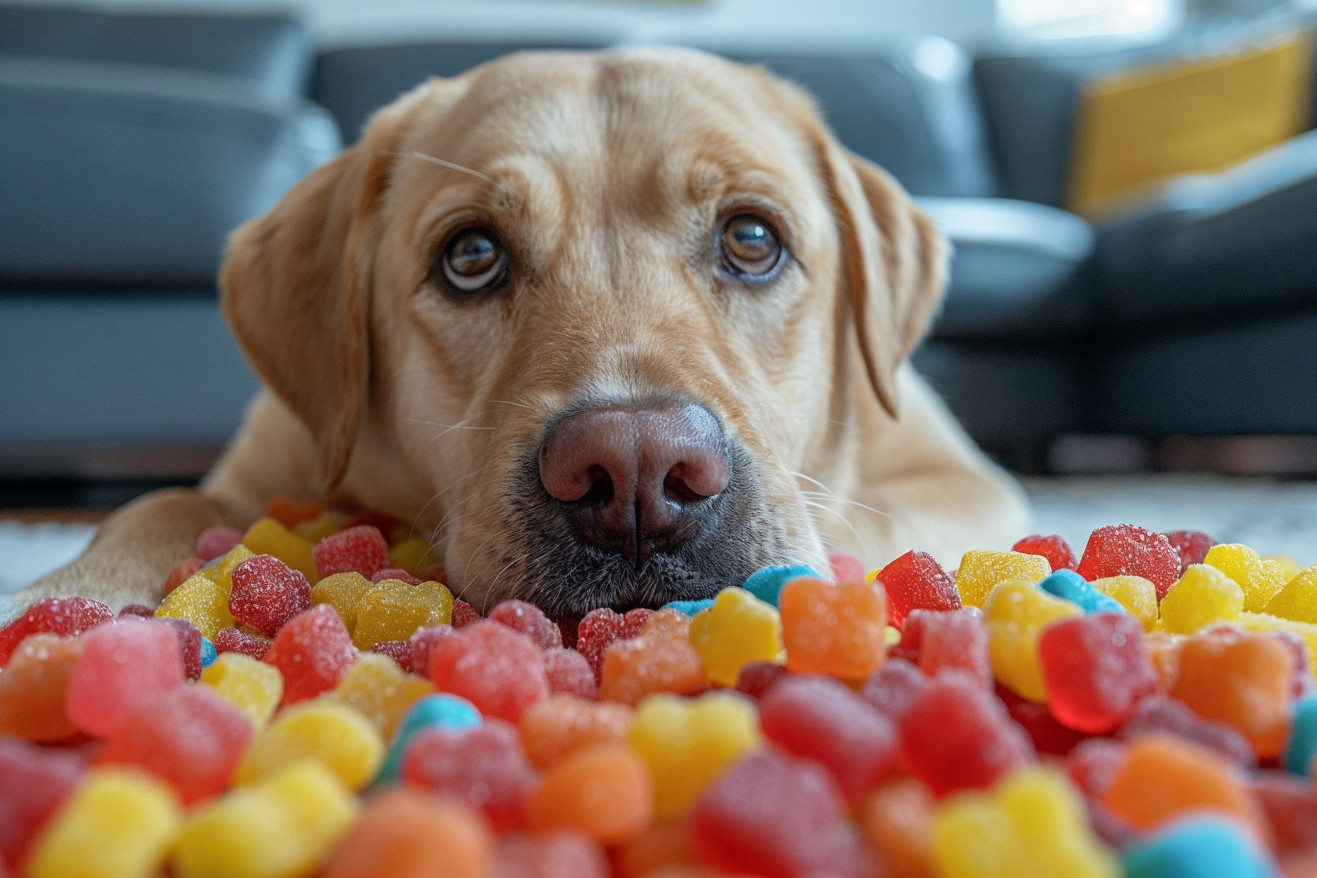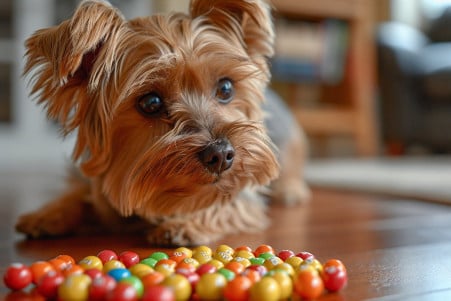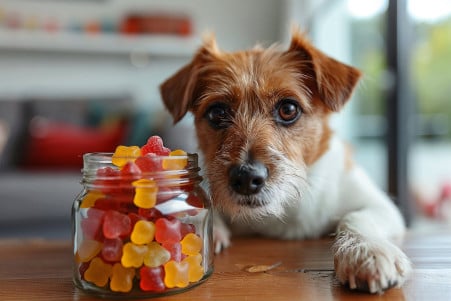Can Dogs Eat Sour Patch Kids? Vet Insights on This Tangy Treat
4 April 2024 • Updated 3 April 2024

If you've ever wondered whether or not your dog can enjoy a sour, gummy candy, you're not alone. While dogs can eat Sour Patch Kids, it's not a good idea. The sugar in the candy is bad for your dog and can lead to health problems like obesity, diabetes, and dental issues if it's eaten in large amounts. The sour powder on the outside of the candy also contains acids that can cause an upset stomach, vomiting, and diarrhea.
By reviewing the information provided by veterinarians and other experts in the field of pet nutrition, you'll learn more about the risks and potential consequences of feeding your dog human food. This will help you know what to look for and what to avoid, and it will help you make better decisions that will benefit your dog's health and happiness while still allowing you to give your dog a treat every now and then.
Can dogs eat Sour Patch Kids?
Potential Health Risks and Symptoms
If dogs eat Sour Patch Kids or other sour candy, the most immediate risk is gastrointestinal distress. According to CandogsEat.com, this can include vomiting, diarrhea, stomach pain, hyperactivity and restlessness. The high sugar content in the candy is also worrisome, as it can lead to obesity, dental issues like plaque and tooth decay, and an increased risk of diabetes.
The citric acid and other acids that make sour candy sour can cause direct irritation to the lining of a dog's stomach. In some cases, this can even lead to bleeding, as explained in this veterinary Q&A that describes a dog that vomited blood after eating Sour Patch Kids. Another risk is that a dog could eat the non-edible packaging, which could cause an intestinal blockage that would need to be surgically removed.
While not all dogs will have such extreme reactions, it's important to watch out for signs of concern like weakness, seizures or frequent, bloody vomiting after a dog eats candy. In these cases, the American Kennel Club recommends taking the dog to the vet immediately, as the dog may need supportive care to address dehydration, low blood sugar and other issues. In the interest of keeping their pets safe, concerned dog owners should be careful about letting their dogs eat human candy and other sweet, acidic foods that aren't made for dogs.
Xylitol in Sugar-Free Candy Poses a Serious Threat
In addition to artificial sweeteners, sugar-free Sour Patch Kids and other sugar-free candies often contain xylitol, an ingredient that is extremely toxic to dogs. According to the FDA, when dogs consume xylitol, it can cause a quick release of insulin, which results in low blood sugar and can lead to liver failure. The Rover.com article explains that even small amounts of xylitol can be toxic to dogs, and the signs of xylitol poisoning in dogs include weakness, vomiting, and seizures.
Xylitol is found in many products commonly found in homes, including baked goods, vitamins, and peanut butter, so pet parents need to be on the lookout for it. The Preventive Vet stresses that if a dog has ingested something that contains xylitol, it's important to seek immediate veterinary care to avoid potentially fatal consequences. Understanding the dangers of xylitol is important for ensuring dogs aren't exposed to this risk that's lurking in sugar-free treats.
Healthier Human Foods for Dogs
Instead of giving dogs sugary human treats like Sour Patch Kids, there are healthier human food options that dogs can enjoy. According to Petco, cooked, unseasoned chicken, turkey, beef, fish, and eggs can be given to dogs in small amounts as treats.
The Sploot Vets post also lists a number of fruits and vegetables that can be given to dogs, including carrots, blueberries, pumpkin, green beans, and apples (without the seeds) in small amounts. Cooked oatmeal, plain yogurt, and natural nut butters can be given to dogs occasionally, as long as they don't have any sensitivities.
For a cool, sweet treat, Healthline recommends giving dogs frozen pieces of healthy fruits like bananas or pineapple. However, it's important to introduce new foods slowly and in small amounts, as some dogs may be allergic or sensitive to certain foods.
By giving dogs these healthier, dog-safe treats, dog owners can give their pets the treats they crave without the dangers of giving them sugary human treats. That said, it's important to watch for accidental consumption and get veterinary help if dogs show worrisome symptoms.
What to Do and Expect After Ingestion
If a dog has eaten Sour Patch Kids or another type of sour candy, it is important to watch for symptoms such as vomiting, diarrhea, or lethargy. As recommended by JustAnswer, it may be helpful to fast the dog for a short period of time to give the stomach a chance to rest, and then gradually reintroduce small amounts of a bland diet like rice and chicken.
That said, if the vomiting continues, the dog won’t eat, or the dog is vomiting frequently or vomiting blood, it is important to see a vet right away. According to the VCA Animal Hospital, the stomach upset that causes these symptoms may need to be treated with medication or fluids to help with dehydration and recovery.
It is also important to make sure that any remaining candy and wrappers are disposed of properly to avoid future ingestion. By doing this and following the advice of veterinarians, dog owners can make sure their pets are able to recover from the effects of eating sour candy and avoid any potential complications.
Conclusion: Putting Your Dog's Health and Wellness First
While Sour Patch Kids aren't toxic to dogs, their high sugar content and potential for gastrointestinal upset make them an unhealthy choice as a dog treat. The danger of sugar-free versions that contain xylitol is even more serious and can be fatal if a dog ingests it.
By learning about the dangers and risks of giving dogs human food, dog owners can make choices that prioritize their dog's health and wellness. This includes offering healthier, dog-safe treats and keeping a close eye on dogs to ensure they don't accidentally eat something that's bad for them.
In the end, being a responsible pet owner means learning about nutrition and consulting a veterinarian when you have questions or concerns.


